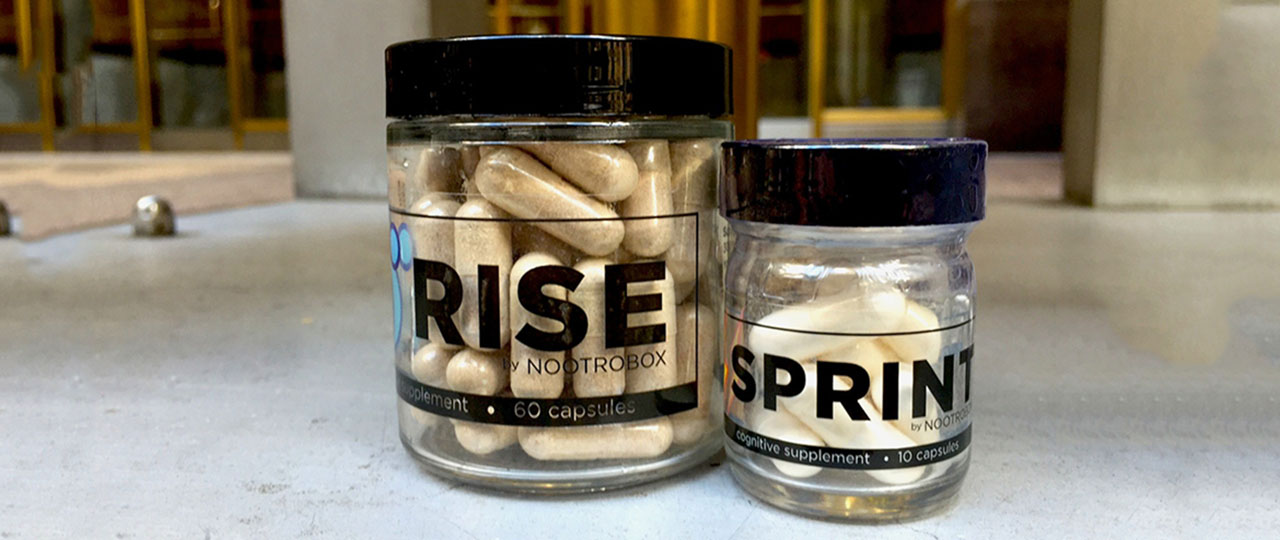In a nootropic space filled with countless brands and supplement stacks, Nootrobox is banking on transparency to make their mark. Founded in 2014 by Stanford grads Geoffreey Woo and Michael Brandt, the company avoids proprietary blends and instead makes a point to list all ingredient dosages and combinations on their packaging. They also double-down on some of the most common, well-studied nootropic ingredients. The result are stacks that focus on consistency and clarity, even if they might not have the eye-popping labels or proprietary blends.
We sat down with Geoffrey, Nootrobox’s CEO, to talk about the supplement industry, quantifying brain enhancement, and what’s next for the California company.
What was your first exposure to nootropics?
One way I look at the space is the home brew tinkerers and computing clubs of the 70s and a bunch of hobbyist hackers tinkering with hardware. Two or three years ago, I started seeing an analog of that with human hardware, the quantified self movement adjusting inputs and outputs of the human body, essentially treating it as hardware. From that point, it was a super interesting trend.
The reason we started building Nootrobox was because if you look at a lot of the existing vendors, people were either playing with grey market stuff, bulk powders imported from abroad, things that weren’t well studied with randomized control trials in humans. That’s an important distinction to make, randomized control trials with young, healthy, adult volunteers. It’s easy to see effects in therapeutic cases like Alzheimer’s or dementia, it’s another standard to see effects in healthy human adults. That transparency and that rigorous approach toward science was something I saw lacking in the space. As a computer engineer, my background was to be skeptical.
And after looking into that, I saw strong bodies of evidence toward certain nootropics. And sometimes you don’t know exactly what’s in proprietary blends. That’s something [BrainWiz] has identified as well, and a stance we’ve taken, you should actually know you’re getting the right potency of active ingredients.
So out of that, we saw an opportunity to do it right and to lead in terms of running our own trials and also building software around it.
You’ve teased in some announcements about Nootrobox software to track performance. Tell us more about that, when will we hear more?
We have an alpha group of people, and hopefully we can unlock some invite codes to your readership soon on this. If you’re not measuring quantitatively, you can’t tell how much of an effect you’re feeling. There’s a broad notion of mood tracking and cognitive states. You can think of it as an analogy to MyFitnessPal, which is used in diet and exercise. Why doesn’t that exist for mental states and mental health? There should be a MyFitnessPal for cognition.
What’s your personal daily stack?
I take RISE daily, and I’ll either switch between SPRINT or GO CUBES as well. GO CUBES are our new chewable coffee product, they’re just coming off the production line and we’re launching them soon. It’s an interesting effect, because you get some sublingual absorption of the actives as soon as you chew them.
So you’re getting an impact on them twice, when you chew and when you digest?
Yep, it’s a different feel than a straight capsule or softgel.
What gaps still exist in the market, and how are you going to address those?
People are getting more and more sophisticated. The supplement industry has been more marketing driven, and that’s one approach to market. Our approach is very much actually producing and running randomized clinical trials and publishing papers. That’s going to be the best way to market moving forward.
We’re running a clinical trial with Maastricht University, and we’re piloting and working on a second clinical trial with an Australian lab. So we’re excited to actually show clinical effects.
In terms of products, we’re very excited about something we’re R&Ding around omega-3 oils and DHA especially. If you think about omega-3 oils, just EPA which is typically associated with heart health, and DHA is more associated with cognitive function and health. So we’re prototyping an omega-3 based product. In terms of other form factors, we’re doing some R&D around sublingual spray products, because it’s a different feel effect than oral digestion, taking something in a capsule. Digestive acid basically makes inert a bunch of potentially interesting compounds. So that’s why we’re playing with sublingual products.
You got a lot of press for raising a large round of funding from big name investors, including Andreessen Horowitz. What’s the main focus of that round?
Research and development, that’s where some of the proceeds are going to running proper clinical trials and product development. Again, the difference is quantifying it. Andreessen Horowitz is a tech venture capital firm, they invest in technology companies. And technology is in our pipeline.
Learn More About Nootrobox
Interested in Nootrobox’s nootropics? Read our reviews of their RISE and SPRINT supplements. And see how we felt after trying Geoffrey’s daily stack of RISE and SPRINT.




